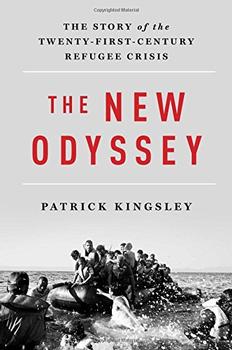Summary | Excerpt | Reviews | Beyond the Book | Readalikes | Genres & Themes | Author Bio

The Story of the Twenty-First Century Refugee Crisis
by Patrick Kingsley
Suddenly, a problem that was once just a western European one became a challenge for eastern Europe too. In 2015, more than 850,000 refugees left Turkish shores3 – and the vast majority marched northwards through the Balkans, all in the hope of reaching the safety and stability of northern Europe. Hungary, which only five years earlier had seen just 2,400 migrants cross its southern borders, suddenly had to deal with a hundred times that number. Its government eventually erected a fence along its southern flank. When people simply rerouted into Croatia, the Hungarians built a second barrier along their Croatian border too.
For the rest of the European Union the crisis created divisions of a more metaphorical kind. Italy and Greece saw no reason why they should cope with such a huge wave of immigrants by themselves and tried various ways of getting the rest of Europe to share the burden. First the Italians and Greeks simply waved many refugees on with a nudge and a wink, instead of encouraging every boat to land on Italian or Greek soil, as required by current EU rules known as the Dublin Treaties. Then they tried the negotiating table, attempting to persuade their neighbours to take in the migrants voluntarily. But throughout months of endless and fruitless conferences and summits, most other EU countries refused to relieve the Greeks and Italians of more than a token few migrants. In the autumn, most governments finally agreed to a deal that would see 120,000 migrants taken off the hands of the frontline states and shared among the rest of the continent. For the wonks in Brussels, it was seen as a small victory and the creation of an important precedent. But in reality it was a pitiful response. The 120,000 amounted to around a ninth of the total that reached Italy and Greece in 2015,5 making the socalled deal almost meaningless. One of the EU's key founding principles – solidarity among member states – seemed to have vanished.
As the year went on, more and more countries erected fences along their borders to direct the flow of refugees, and a few threatened to seal their borders entirely. In the process, they endangered another value central to the EU's soul – the concept of free movement between mainland European countries, a principle that had first been enshrined with great fanfare by the Schengen agreement of 1985 and that is still considered one of the greatest achievements of the European project. Along with the simultaneous fallout from the Greek economic meltdown, the migration crisis had become one of the biggest threats to the cohesion of the European Union in the organisation's history.
It was also one of the most unnecessary. In a way, the refugee crisis is something of a misnomer. There is a crisis, but it's one caused largely by our response to the refugees, rather than by the refugees themselves. The figure 850,000 sounds like a lot – and in terms of historic migration to Europe it is. But this is only about 0.2 per cent of the EU's total population of roughly 500 million, an influx that the world's richest continent can feasibly absorb, if – and only if – it's handled properly. There are countries whose social infrastructure is at a breaking point because of the refugee crisis – but they mostly aren't in Europe. The most obvious example is Lebanon, which houses at least 1 million Syrian refugees within a total population of roughly 4.5 million. That's around one in five people – a ratio that Europe should have been embarrassed by.
So too should America. This crisis is billed as a European one, but it is also the result of America's failure to resettle a meaningful number of Syrian refugees and so lessen the burden on the Middle East and Europe. In the aftermath of the Vietnam war, America led the international resettlement program – taking 800,000 of the 1.3 million people resettled in the global north. In the aftermath of the Syrian crisis – a crisis partly stoked by American support for Syrian factions and by its earlier meddling in Iraq – the US promised to take just 10,000, amid alarmism about immigrants.
Excerpted from The New Odyssey by Patrick Kingsley. Copyright © 2017 by Patrick Kingsley. Excerpted by permission of Liveright / WW Norton. All rights reserved. No part of this excerpt may be reproduced or reprinted without permission in writing from the publisher.
Your guide toexceptional books
BookBrowse seeks out and recommends the best in contemporary fiction and nonfiction—books that not only engage and entertain but also deepen our understanding of ourselves and the world around us.